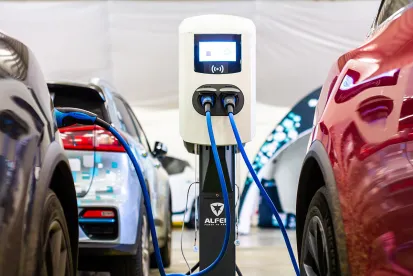Electric vehicles (EVs) are becoming increasingly popular, especially with rising gas prices over the past year. EVs now make up roughly three percent (3%) of the global vehicle fleet, up from one percent (1%) at the end of 2020. Last year, President Biden announced a lofty goal for EVs to make up fifty percent (50%) of all vehicles sold in the United States by 2030. The Bipartisan Infrastructure Law, signed by President Biden in November 2021, invests billions of dollars in EV chargers to create accessible charging stations for electric vehicles, and the Inflation Reduction Act passed by Congress in August 2022 provides incentives and tax credits to encourage Americans to purchase EVs.
America’s emphasis on renewable energy and EVs presents an opportunity for retailers and developers to integrate EV charging stations into retail centers. In addition to tax credits available at both the state and federal level for EV charging stations, charging stations located at shopping centers draw EV drivers into stores they may not otherwise visit but for the need to charge their vehicle. Approximately ninety percent (90%) of EV drivers make a purchase while charging at a retail center. By installing EV charging stations, retailers may also signal their commitment to sustainability and ESG (environmental, social and governance) investing.
Retailers have the option of either buying, installing and owning the EV charging stations themselves or contracting with a third-party EV charging company that owns and controls the EV charging stations. Both business models can be advantageous for the retailer. If a retailer elects to own and operate the EV charging stations, they assume the risks of ownership and maintenance but can also dictate the fees for charging costs and receive that direct revenue stream. Some retailers may opt to offer free charging to encourage EV drivers to patronize their store while charging their vehicle.
If a retailer decides to outsource EV charging station ownership and maintenance to a third-party company, retailers should consider how best to structure the underlying real estate transaction for the leasing or licensing of the land upon which the EV charging stations will be installed. Third-party EV charging companies will typically charge fees to EV drivers for access to their charging stations, which may be based on per unit of electricity delivered or per minute of charging time. In this business model, retailers hosting the EV charging stations may not receive the charging revenue, but retailers can and should receive direct income in the form of rent or access fees for permitting the charging stations on their land. Retailers should also pay attention to the increased electricity cost associated with installation of EV charging stations. EV charging stations significantly increase the total electricity usage of a retail establishment, and if retailers contract with a third-party EV charging company, retailers should recoup those increased electricity costs from the EV charging companies. Retailers may also want to incentivize EV drivers to charge their vehicles at hours when store traffic may be lower to avoid electricity overload.
Whether retailers elect to buy and own EV charging infrastructure themselves or engage with a third-party EV charging company, retail property owners have an opportunity to take advantage of the surge of EVs. Implementing EV charging infrastructure at retail centers is both an economic opportunity and an integral component to widespread EV adoption in America. If retailers have the land area and electric capacity to install EV chargers, implementing EV infrastructure is a valuable opportunity both economically and environmentally.




 />i
/>i

